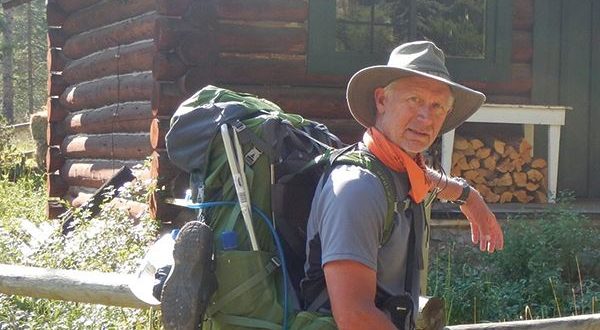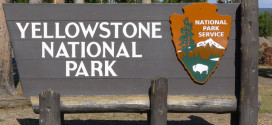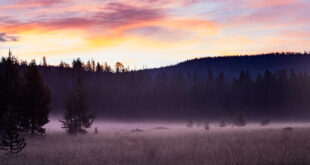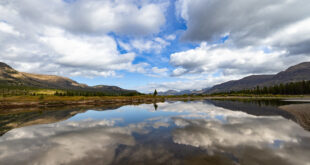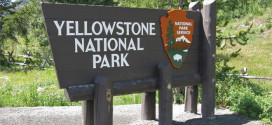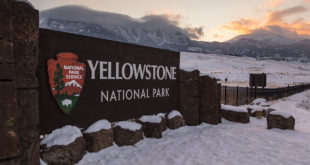Orville “Butch” Bach has worked in Yellowstone National Park as a ranger for more than 43 years.
As you might imagine, he’s got some stories to tell, which he has told in two books. One, Tracking the Spirit of Yellowstone: Recollections of 31 Years as a Seasonal Ranger was published in 2005. His more recent book, published in 2016, is Reflections from Yellowstone and Beyond. Both include illustrations by his wife, Margaret.
Butch—who, with his folksy Alabama accent and friendly demeanor, is too hard to refer to as “Bach,” which is standard writing practice—was in Livingston last week to give a talk at the Yellowstone Gateway Museum of Park County. The meeting room was packed with fans of both Yellowstone and Butch. He’s been a familiar face at Old Faithful, where he works in the summer as an interpretive ranger.
His “all-time greatest experience” happened a couple of years ago. He was hiking in the park’s western region near the Cougar Creek patrol cabin through waist-high grass. He was alone, alert to his surroundings, bear spray at hand, when without a sound, a wolf stood up in the tall grass about 25 feet away. Butch commented that he certainly didn’t mean to violate the park rule that humans must stay at least 100 yards away from wolves (and bears) and 25 yards from other animals.
The animal looked at him without growling, baring their teeth or bristling, Butch recalled. He must have stumbled on a pack having a nap in a daybed because then another wolf stood up. And then another. All told, seven wolves stood up. They all walked away without threatening him in any way. When they got a little further away, one howled.
He recalled a conversation he had—after settling permanently in Bozeman a few years ago after retiring from a career teaching economics in Tennessee—with a local member of the Montana legislature who was not a wolf fan.
He told me if we allowed wolves to repopulate around Yellowstone it wouldn’t be long before they’d be coming to town and eating our children at their school bus stops, Butch said, to groans from the audience.
But while he was walking on his way on the Cougar Creek trail, where the wolves had all regarded him peacefully, he thought, “We make these animals out to be more ferocious than they are.”
And he had a funny story about another park animal: Bigfoot. Two of his friends said they saw a creature in the Electric Peak area that walked upright and swung its arms. Other friends talk of hearing a “Johnny Weissmuller-like” sound near Table Mountain. (Johnny Weissmuller was the popular actor who played Tarzan in the movies of the 1930s and ‘40s.) And another friend told him the backcountry trail crews had heard the sound, too, and it scared them.
Butch quoted another longtime Yellowstone ranger, Jerry Mernin.
“When you spend a lot of time in the backcountry, you get a little weird.”
Butch was pretty casual about the unexplained Bigfoot stories.
“Myths abound in Yellowstone, and this is one we can’t explain,” he said.
Another story he told was about coming out of the backcountry after a multi-day trip in the fall of 2013, right before the government shutdown at the time. The shutdown eventually turned into a two-week-plus stretch from Oct. 1 to Oct. 16.
He had left on his trip knowing the shutdown was a possibility. When he reached the end of his hike on the Mary Mountain trail, he emerged on the road between Old Faithful and Madison, not knowing if the shutdown had occurred. But the absence of traffic on the road made it clear. The silence told it all.
A few days later, in West Yellowstone, he ran into an Australian couple. They had come all this way to see Yellowstone and were denied access. They didn’t understand the government shutdown and why they were shut out of a dream destination.
“I’ve never been so ashamed and embarrassed about my government,” Butch said.
And he also spoke of the changes he’s seen in 40-plus years. When he first worked at Old Faithful, the main road still went right through the Upper Geyser Basin, past Old Faithful, Castle Geyser, Riverside Geyser and Morning Glory Pool. And the grizzly bears were in trouble, their population down. These were two examples of things that have been improved.
But the hardest thing to have seen in the past 40 years, he said, is the dead and dying whitebark pine trees in the high country above 9,000 feet, a casualty of a warming climate.
His chat was like sitting in a living room listening to a favorite uncle tell stories. Butch held the room spellbound as well as making us all laugh. He was very careful to tell us he was speaking as a private citizen and not as a representative of his longtime employer, the National Park Service.
“It’s been a blessing to work for the agency for 43 years,” he said, reflecting on his time as a ranger.
Butch is also the author of a popular hiking guide, Hiking the Yellowstone Backcountry. His books are available at regional bookstores, online from the usual sources, or by emailing bluewillowpress@yahoo.com.
 Yellowstone Insider Your Complete Guide to America's First National Park
Yellowstone Insider Your Complete Guide to America's First National Park
